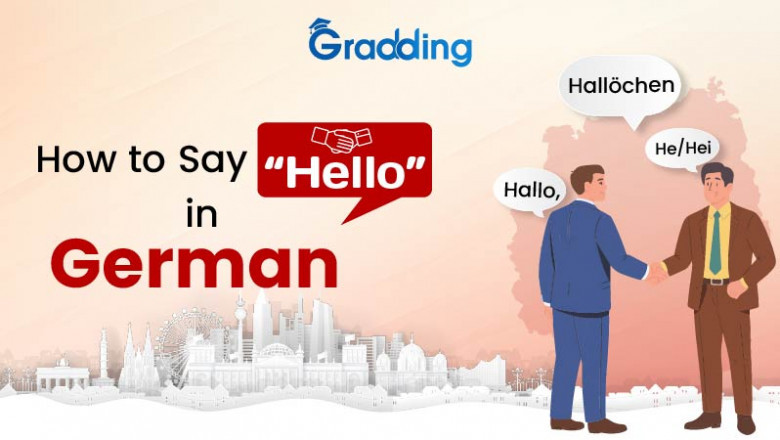views
Explore Different Ways to Say Hello In German Language
Learning a new language is the most valuable skill today. Many people prefer to learn the German Language. It can help them to get a visa or admission to top colleges in Germany. So, they start by learning how to say hello in German because it will help them to start a conversation with locals. But here, the question is how to learn. Well, this article is the answer to this question. Read and know the different ways to say hello and expert tips to reach A1 level German proficiency.
Different Ways to Say Hello in German
Germany is the land of opportunities. Many students dream to get admission at top colleges on this land. So, they prepare well for Goethe-Zertifikat, TestDaF, DSH, and Österreichisches Sprachdiplom (ÖSD) to become proficient in the local language. However, they must learn the different ways to say hello in the local language. It will help them to start with a greet with the native speakers and start a conversation.
Formal Ways to Say Hello In German
People planning to study or work in German-speaking countries must know how to say hello in a formal way. It will help them to greet their seniors or college authorities in the local language. However, there are different ways to say hello in German in a formal way mentioned below. You must know them. It will help you to use the correct word at the right time.
- Guten Tag: Many people use this German word while greeting someone. This German word means good day. However, you must know that it is also used in an informal language.
- Guten Morgen: It is a basic way to say hello in German while greeting someone during the morning hours.
- Guten Abend: This German word is used when you meet someone during evening hours. It is one of the most commonly word used in both formal and informal greetings.
Informal Ways to Say Hello in German
Students can not use the formal way to say hello in German every time. So, they must know the different words to they can use when they meet someone in an informal situation. It will help them to sound familiar with the local language and start a conversation. However, different variations of saying hello in in informal tone in the local language of Germany are as follows:
- He/Hei: This German word is used to meet someone in an informal environment.
- Tach, Morgen, and Abend (day, mornin’, and evenin’): Students can use these words to say good morning, good evening and good day in an informal tone. It is the best way to start a new conversation.
- Hallo, Leute! (Hello, folks! /Hello, people!): These words are used when you greet friends or colleagues during a casual meeting.
Slang Words for Saying Hello in German
Local people use some slang words to greet someone. Every aspirant looking forward to moving to German-speaking nations must know them. However, it will help to sound like locals and start a new conversation easily.
Let's explore them below.
- Was geht ab: It is a common German slang used while meeting friends. It means What's up in the English language.
- Wie läuft’s?: It is a famous German slang used in both formal and informal conversations. It means, "How’s it going". Locals use this word to ask, "Is everything okay"?
These were some common words to say hello in German. But that's not enough to become proficient in the language. So, the best study abroad experts guide them to follow some tips for their practice. However, let's explore them in this part of the article.
Expert Tips for Become Proficient in German
Students need a strong vocabulary to become proficient in the German language. There are plenty of ways to greet someone in this language. Due to this, students find it difficult to pick the right word based on the situation. So, the best German trainers guide them to follow some tips mentioned below and improve their skills.
- Try to learn the literal translation of the words.
- Understand the context of the words and practice to use them at the right place and time.
- Watch German movies and try to understand how actors greet each other.
- Do regular practice and clear all the basics. Get help from the experts for the best assistance.
Conclusion
In conclusion, it is important to achieve A1 level German proficiency. It will help them to come a step closer to become eligible for a work or study visa to top German-speaking countries. However, the quest is how to reach this level. Well, most students trust Gradding for this purpose. They have a team of dedicated trainers who take regular doubt-clearing sessions. Further, they assist with AI-powered mock tests that help to achieve an A1 level of language proficiency just in 3 months.














Comments
0 comment